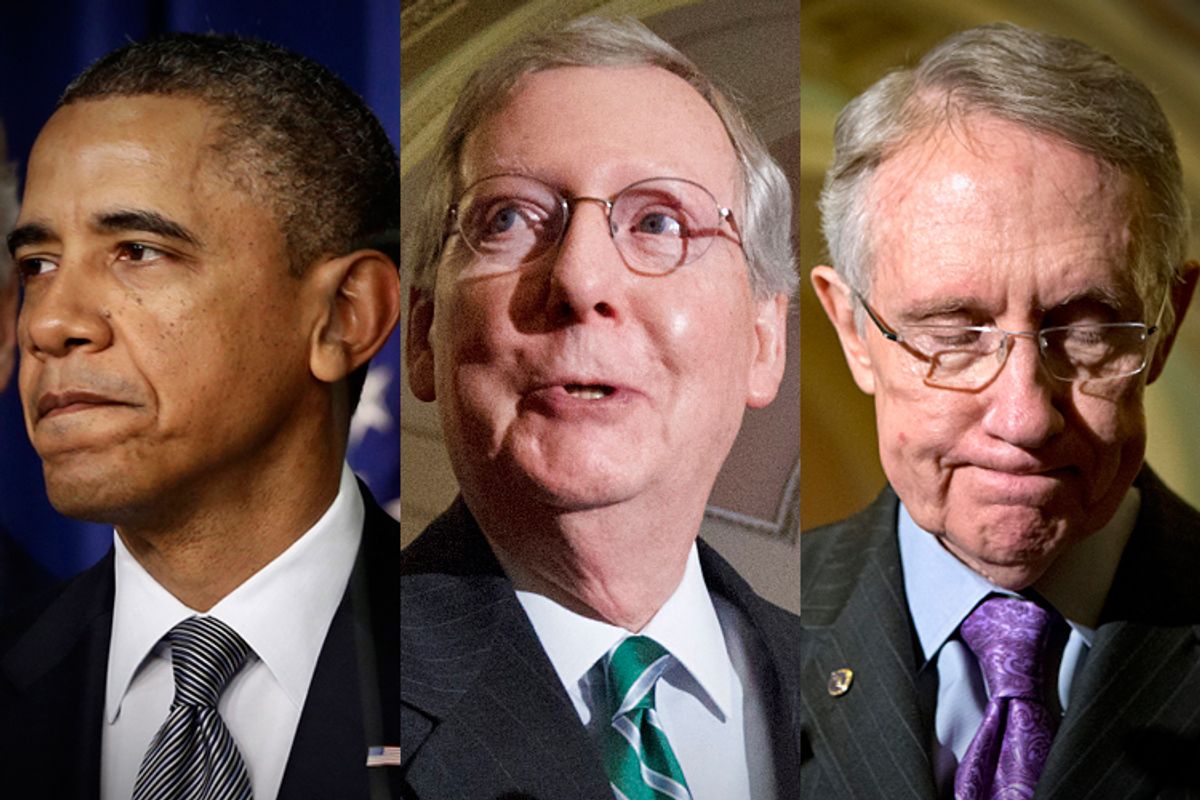The New Republic’s Danny Vinik has spotted an emerging trend in Republican politics leading into the midterms: grandiloquent accusations of Barack Obama’s “lawless” presidency. As the Affordable Care Act slowly recedes in the minds of Republicans as the 2014 alpha-and-omega, new obsessions have the opportunity to come to the fore, and attacking the president for his hostility to the rule of law and the Constitution is the latest fad.
Just last week, Rep. Tom Cotton, running for the Senate in Arkansas, spoke before the Federalist Society about Obama’s “executive overreach,” arguing the case that the president’s actions have been “anti-constitutional,” as opposed to “unconstitutional.”
Here’s Cotton’s explanation of his “unusual phrasing.”
Now, you might say “why the unusual phrasing?” Why anti-? Why not “unconstitutional,” which is more common? Well, let me explain. The prefix un- simply means “not.” If an action or law is unconstitutional, that simply means it’s not constitutional. The prefix anti-, though, means “opposed to,” or “hostile to,” and this term, I think, better captures our president, the spirit of his administration and in fact the spirit of modern liberalism.
Now, I tend to think that accusing the president of actively and maliciously working to undermine the country’s legal foundation is itself a pretty extreme position. On the right, though, this is not a particularly controversial stance to take. For years, Republicans have fought Obama’s use of presidential power on just about everything, and these accusations of lawlessness are grounded in the conservative belief that Obama’s presidential authority is not legitimate.
I should make clear up front that the Obama White House, like almost every administration before it, is constantly looking for ways to shift the balance of power among the three branches toward itself. This ongoing tug-of-war does raise constitutional issues and should of course embolden the legislature and the judiciary to function as checks on the executive. That’s how the system was designed to work.
But Republicans have all too often been in opposition to any assertion of executive authority. And the “lawless” actions the Republicans decry frequently stem directly from Republican efforts to prevent Obama from performing the mundane tasks of the presidency.
If you remember the good old days before we had Obamacare to fight incessantly about, one of the big fake scandals of Obama’s first year in office was his appointment of “czars” — presidential advisers whose jobs are not subject to Senate approval. Presidents have been appointing czars with little to no fanfare for decades, but Republicans got it in their heads that Obama’s czars were somehow an overreach and abuse of power. So they tacked an amendment onto an appropriations bill to strip funding for czar-type positions within the White House. Obama, in turn, issued a signing statement to the bill stating that he would ignore that section because it was clearly unconstitutional. That signing statement ginned up a new round of outrage from conservatives who attacked Obama for ignoring the law.
The same dynamic came into play in the fight over nominations by the executive branch. At the beginning of Obama’s presidency, Senate Republicans set up an impassable and unprecedented roadblock to the nominations process, filibustering dozens of nominees for little reason other than they’d been nominated by the president. To ensure that Obama could not make appointments to those positions during Senate recesses, the Republicans forced pro-forma sessions to prevent the Senate from adjourning completely. Faced with an intractable opposition, Obama made the recess appointments anyway, and a bizarre constitutional crisis ensued which the Supreme Court will adjudicate soon.
These cases aren’t examples of the administration setting out to expand its authority and running into resistance from Congress. The president was trying to perform the basic tasks of the executive branch and was stymied by a legislative minority that doesn’t view his exercising of that power as legitimate.



Shares